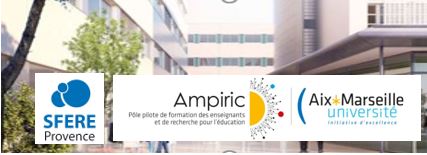La théorie historico-culturelle de l'activité (CHAT) (Leontyev, 1981; Vygotsky, 1978) et le modèle des systèmes d'activité (Engeström, 1987, 2000) est notre cadre théorique d'explicitation des modalités d'accompagnement du changement au sein d'un établissement scolaire. La démarche transformative inhérente à un Laboratoire du Changement (Lab_C) tire son origine dans la Developmental Work Research ancrée sur la méthode de stimulation duale de Vygostky. Son usage permet de dépasser les problèmes ou contradictions suscités par un processus de changement telle que l'innovation pédagogique et confère à l'établissement scolaire un caractère « apprenant ». Dans l'établissement scolaire, les enseignants et l'équipe éducative acquièrent une posture agentive et collaborative tout au long du processus (Engeström & Sannino, 2010). Cette communication explicitera les modalités de mise en œuvre de ce type de recherche collaborative, transformative et longitudinale qui vise l'apprentissage expansif systémique et contribue à repenser la formation des équipes éducatives et pédagogiques dans le cadre d'une « recherche fondamentale de terrain ». Un cas illustrant l'application locale des politiques éducatives de l'école inclusive dans une école Genevoise (Ciavaldini-Cartaut, 2019, 9-10 juillet) permettra de discuter d'une autre perspective : celle de l'innovation pédagogique pour la réussite scolaire et du renouveau du management d'établissements scolaires qui se veulent incubateurs de créativité au sein de leur territoire.
MOTS-CLÉS : Laboratoire du Changement, théories de l'activité, recherche développementale, apprentissage expansif, établissement apprenant
Supporting social innovation in education according in the activity theories perspectives: developing a Laboratory of Change in a “learning school”
ABSTRACT
The cultural-historical theory of activity (CHAT) (Leontyev, 1981; Vygotsky, 1978) and the activity systems model (Engeström, 1987, 2000) is our framework for explaining the ways in which innovation is supported within a school. The transformative approach inherent in a Laboratory for Change (Lab_C) has its origins in Developmental Work Research based on Vygostky's dual stimulation method. Its use makes it possible to overcome the problems or contradictions caused by the process of change and gives the school a "learning" character. In the school, teachers and the educational team acquire an agentive and collaborative posture throughout the process (Engeström & Sannino, 2010). This paper will explain how to implement this type of collaborative, transformative and longitudinal research that aims at systemic expansive learning and contributes to rethinking the formation of educational and pedagogical teams in the context of “fundamental field research”. A case study illustrating the local application of inclusive school education policies in a Geneva school (Ciavaldini-Cartaut, 2019, 9-10 July) will provide an opportunity to discuss another perspective: the pedagogical innovation for school success and the renewal of the management of schools that want to become incubators of creativity within their territory.
KEYWORDS
Change laboratory, activity theory, developmental research, expansive learning, learning school
REFERENCES
Ciavaldini-Cartaut, S. (2019, 9-10 juillet). « Le travail collectif pour une école inclusive examiné à l'aune des théories de l'activité et des capabilités ». Symposium Travailler à une école inclusive : vers des environnements capacitants pour tous les acteurs concernés ». REF Université de Toulouse Paul Sabatier, France.
Engeström, Y. (1987). Learning by Expanding: an activity-theoretical approach to developmental research. Helsinki: Orienta-Konsultit.
Engeström, Y. (2000). Activity theory as a framework for analyzing and redesigning work. Ergonomics, 43(7), 960-974.
Engeström, Y., & Sannino, A. (2010). Studies of expansive learning: Foundations, findings and future challenges. Educational Research Review, 5(1), 1-24. doi:http://dx.doi.org/10.1016/j.edurev.2009.12.002
Leontyev, A. N. (1981). The problem of activity in psychology. In Wertsch J. V. (Eds.), The Concept of Activity in Soviet Psychology (pp. 37-71). Armonk, New York: M.E. Sharpe.
Vygotsky, L. S. (1978). Mind in Society: The Development of Higher Psychological Processes. Cambridge, MA: Harvard University Press.

 PDF version
PDF version
